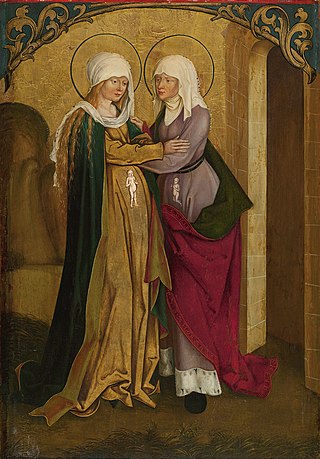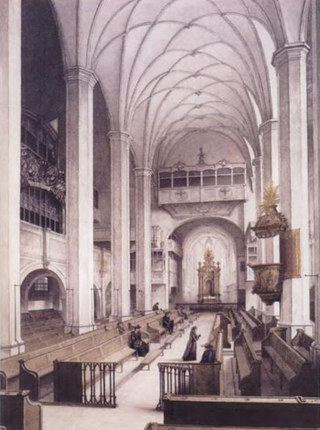Related Research Articles

Johann Ludwig Bach was a German composer and violinist.

Wachet auf, ruft uns die Stimme, BWV 140, also known as Sleepers Wake, is a church cantata by Johann Sebastian Bach, regarded as one of his most mature and popular sacred cantatas. He composed the chorale cantata in Leipzig for the 27th Sunday after Trinity and first performed it on 25 November 1731.

Johann Sebastian Bach composed the church cantata Es ist das Heil uns kommen her, BWV 9 in Leipzig for the sixth Sunday after Trinity between 1732 and 1735. It is a chorale cantata, based on the hymn "Es ist das Heil uns kommen her" by Paul Speratus. Bach composed the cantata to fill a gap in his chorale cantata cycle written for performances in Leipzig from 1724.

In 1724 Johann Sebastian Bach composed the church cantata Meine Seel erhebt den Herren, BWV 10, as part of his second cantata cycle. Taken from Martin Luther's German translation of the Magnificat canticle, the title translates as "My soul magnifies the Lord". Also known as Bach's German Magnificat, the work follows his chorale cantata format.
Konrad Junghänel is a German lutenist and conductor in the field of historically informed performance, the founder and director of the vocal ensemble Cantus Cölln.

Johann Sebastian Bach composed the church cantata Ich hatte viel Bekümmernis, BWV 21 in Weimar, possibly in 1713, partly even earlier. He used it in 1714 and later for the third Sunday after Trinity of the liturgical year. The work marks a transition between motet style on biblical and hymn text to operatic recitatives and arias on contemporary poetry. Bach catalogued the work as e per ogni tempo, indicating that due to its general theme, the cantata is suited for any occasion.

Es erhub sich ein Streit, BWV 19, is a church cantata by Johann Sebastian Bach. He composed it in Leipzig in 1726 for the Feast of Saint Michael and first performed it on 29 September 1726. It is the second of his three extant cantatas for this feast.
Johann Schelle was a German Baroque composer.

Johann Sebastian Bach composed the church cantata Nun komm, der Heiden Heiland, BWV 61, in Weimar for the first Sunday in Advent, the Sunday which begins the liturgical year, and first performed it on 2 December 1714.

Schauet doch und sehet, ob irgend ein Schmerz sei, BWV 46, is a church cantata by Johann Sebastian Bach. He composed it for the tenth Sunday after Trinity and it was first performed on 1 August 1723 in Leipzig.
Christoph Genz is a German tenor in opera and concert.

Johann Sebastian Bach composed the secular cantata Die Zeit, die Tag und Jahre macht, BWV 134.1, BWV 134a, while he was in the service of the court of Leopold, Prince of Anhalt-Köthen. Bach wrote the work as a serenata for the celebration of New Year's Day 1719.

Johann Sebastian Bach composed the church cantata Komm, du süße Todesstunde, BWV 161, in Weimar for the 16th Sunday after Trinity, probably first performed on 27 September 1716.

Johann Sebastian Bach composed the church cantata Herr Christ, der einge Gottessohn, BWV 96, in Leipzig for the 18th Sunday after Trinity and first performed it on 8 October 1724. The chorale cantata, part of Bach's second annual cycle, is based on the hymn in five stanzas "Herr Christ, der einig Gotts Sohn" by Elisabeth Cruciger, published in Eyn geystlich Gesangk Buchleyn in 1524.

Er rufet seinen Schafen mit Namen, BWV 175, is a church cantata by Johann Sebastian Bach. He composed the cantata in Leipzig for the third day of Pentecost and first performed it on 22 May 1725.

Preise, Jerusalem, den Herrn, BWV 119, is a sacred cantata by Johann Sebastian Bach. He composed it in Leipzig for Ratswechsel, the inauguration of a new town council, and first performed it on 30 August 1723.

The Monteverdi-Chor Hamburg is a mixed choir in Hamburg, the chamber choir of the University of Hamburg since 1961. Founded in 1955 by Jürgen Jürgens and directed by him until 1994, it is one of Germany's most famous concert choirs. The choir is well known for its interpretations of Baroque and Renaissance music, but covers choral music from the Renaissance to contemporary music. Since 1994, the conductor has been Gothart Stier.

Man singet mit Freuden vom Sieg, BWV 149, is a church cantata by Johann Sebastian Bach. He composed the work in Leipzig for Michaelmas and first performed it on 29 September 1729. It is the last of his three extant cantatas for the feast.
Knut Schoch is a German tenor in opera and concert as a specialist in the field of historically informed performance, and an academic voice teacher.

J. S. Bach - Das Kantatenwerk is a classical music recording project initiated by the record label of Telefunken in 1971 to record all 193 sacred Bach cantatas. The project was entrusted to Nikolaus Harnoncourt and Gustav Leonhardt. Each conductor had his own instrumental ensemble, based in Austria and the Netherlands respectively.
References
- ↑ "Wilfried Jochens (Tenor)". Bach Cantatas. Retrieved 16 August 2014.